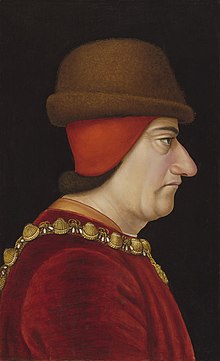Louis XI
Louis XI (3 July 1423 – 30 August 1483), called "Louis the Prudent" (French: le Prudent), was King of France from 1461 to 1483. He succeeded his father, Charles VII. Louis entered into open rebellion against his father in a short-lived revolt known as the Praguerie in 1440. The king forgave his rebellious vassals, including Louis, to whom he entrusted the management of the Dauphiné, then a province in south-eastern France. Louis's ceaseless intrigues, however, led his father to banish him from court. From the Dauphiné, Louis led his own political establishment and married Charlotte of Savoy, daughter of Louis, Duke of Savoy, against the will of his father. Charles VII sent an army to compel his son to his will, but Louis fled to Burgundy, where he was hosted by Philip the Good, the Duke of Burgundy, Charles' greatest enemy.

Quotes
edit- Divide et impera.
- Divide and conquer.
- Edward Coke, Institutes, Pt. IV, cap. i. p. 35), insisting on the invincibleness of unity, stigmatises the quotation as explosum illud diverbium—"that exploded adage". A century after Louis XI, Catherine de Medici made the axiom her own: Diviser pour régner, c’était déja sa maxime, la régle de sa conduite (Antonin Roche; Philaréte Chasles, Histoire de France, Paris, 1847, vol. 2, p. 136). In Voltaire’s Don Pèdre (4, 2), the hero, speaking of his "ally", Charles V of France, says, Divisez pour régner; voila sa politique—"Divide to reign; there you have his policy."
- Cited in Classical and Foreign Quotations (1904), no. 573
- Qui ne sait dissimuler, ne sait régner.
- He who does not know how to dissemble, knows not how to reign.
- Maxim of Louis XI, cited in Classical and Foreign Quotations (1904), no. 2304
- Reported in Hoyt's New Cyclopedia of Practical Quotations (1922) as "He who knows not how to dissimulate, can not reign."
- When pride and presumption walk before, shame and loss follow very closely.
- Reported in Gleason's Pictorial, vol. 5, no. 1 (2 July 1853), p. 175
About
edit- Louis XI, the great Spider King of France, had a weakness for astrology. He kept a court astrologer whom he admired, until one day the man predicted that a lady of the court would die within eight days. When the prophecy came true, Louis was terrified, thinking that either the man had murdered the woman to prove his accuracy or that he was so versed in his science that his powers threatened Louis himself. In either case he had to be killed. One evening Louis summoned the astrologer to his room, high in the castle. Before the man arrived, the king told his servants that when he gave the signal they were to pick the astrologer up, carry him to the window, and hurl him to the ground, hundreds of feet below. The astrologer soon arrived, but before giving the signal, Louis decided to ask him one last question: “You claim to understand astrology and to know the fate of others, so tell me what your fate will be and how long you have to live.” “I shall die just three days before Your Majesty,” the astrologer replied. The king’s signal was never given. The man’s life was spared. The Spider King not only protected his astrologer for as long as he was alive, he lavished him with gifts and had him tended by the finest court doctors. The astrologer survived Louis by several years, disproving his power of prophecy but proving his mastery of power.
- Robert Greene, The 48 Laws of Power (1998)
- Throughout history, security as much as status has been an obstacle to summitry. In 1419 France was in turmoil from war with the English and a power struggle provoked by the periodic insanity of King Charles VI. On September 10 the dauphin, Charles’ son, conferred on a bridge near Rouen with their archrival, John, Duke of Burgundy. Both men were well attended by guards and a barrier had been erected in the middle, with a wicket gate bolted on either side to allow passage only by mutual consent. During the conference Duke John was persuaded to come through the gate—only to be cut down by the dauphin’s bodyguard. The dauphin, inheriting the throne as Charles VII, recovered much of France from the English. When his son, Louis XI, met the Yorkist king Edward IV at Picquigny near Amiens in 1475 to conclude a peace treaty, the fate of Duke John was much in mind. The chronicler Philippe de Commines tells how this conference was held on a bridge over the Somme. Louis insisted that across the middle of the bridge and along its sides his carpenters should build “a strong wooden lattice, such as lions’ cages are made with, the hole between each bar being no wider than to thrust in a man’s arm.” The two kings somehow managed to embrace between the holes and conducted their meeting in secure cordiality.
- David Reynolds, Summits: Six Meetings that Changed the Twentieth Century (2007), p. 15